Photos by Andrea Calvetti
Despite the much bemoaned departure of band co-founder Jade Castrinos following their last full-length, Edward Sharpe and the Magnetic Zeros still had 10 different musicians packed on the tiny stage at Chicago’s Old Town School of Folk Music in an intricate intertwining of instruments and personality. It was not immediately clear, however, if their eponymous, messianic leader himself would appear, as his name was crossed off the bill.
It seemed in his place stood an exposed Alex Ebert, with the somewhat intoxicated crooner intermittently grabbing at his throat ("You pull out the bone resting on top of your larynx, ‘cause when you strain your voice this thing tightens up and closes off your esophagus," he tells me). For the first time ever, The Magnetic Zeros performed the still unreleased PersonA, and only PersonA, in its entirety, imbuing the crowd – some of whom were given Phantom of the Opera-esque masquerade masks to obscure their identity – with a palpable sense of intrigue, despite one fan’s persistent requests for “40 Day Dream.” (“It’s like my “Free Bird,” Ebert joked. “I was so full of shit then.”)
Playful and intimate, Ebert sat on the stage edge or wandered through the audience at times, even occasionally referring to printed lyric sheets as the band stumbled vulnerably through this seminal step in the set’s lifecycle. These beginnings were paralleled by stories of his new daughter surrounding his “Lullaby” to her.
With even the LP name itself left purposefully muddled - whether it's “persona” or “person A” is up for interpretation – the proceedings felt poised on the threshold of a new, increasingly self-aware era for the folk troubadours made famous for a certain whistling tune seven years ago. Meeting a few days after Easter, it seemed appropriate for Transverso to sit down with the reborn frontman in a repurposed church pew outside the basement greenroom.

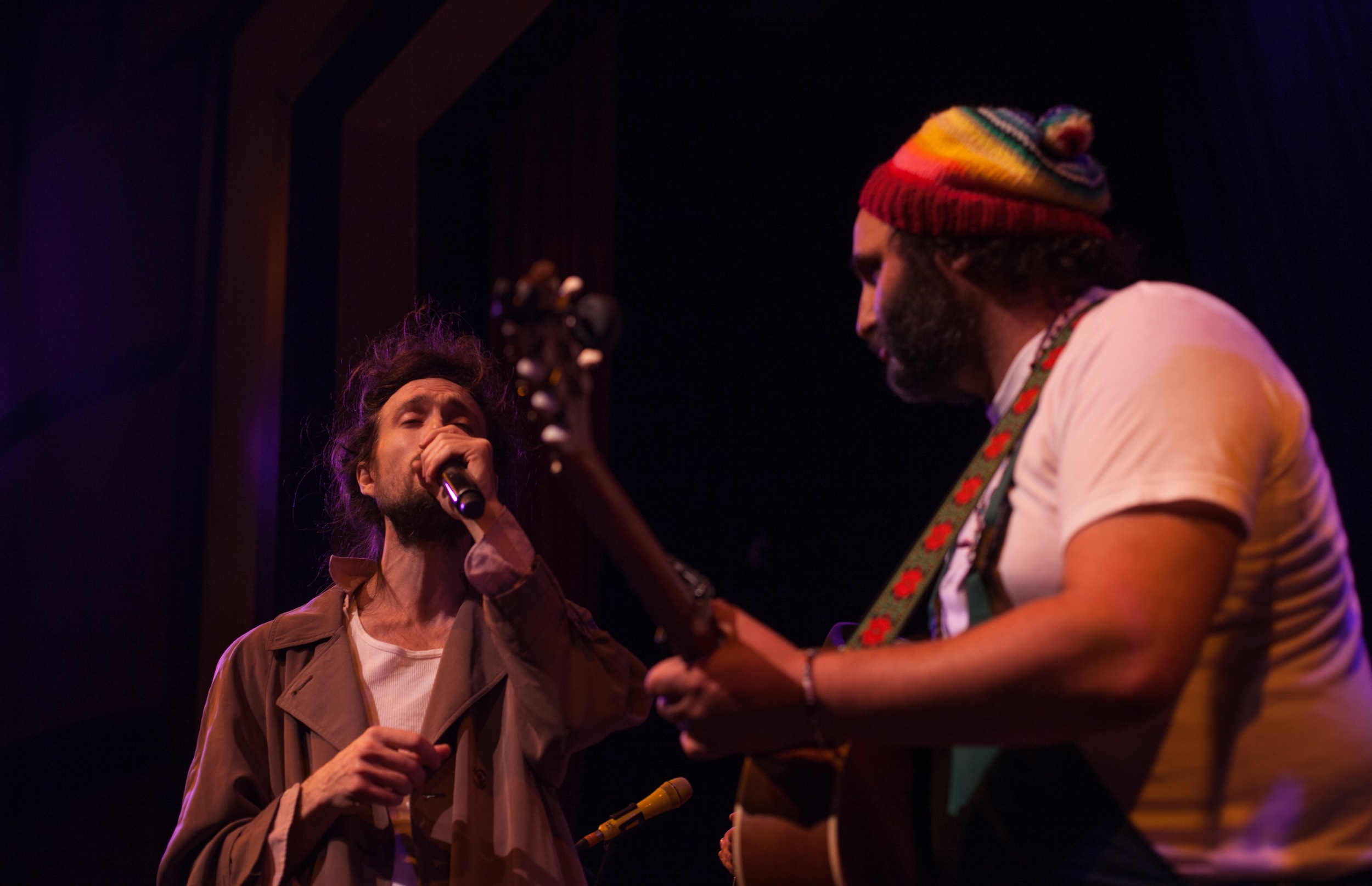


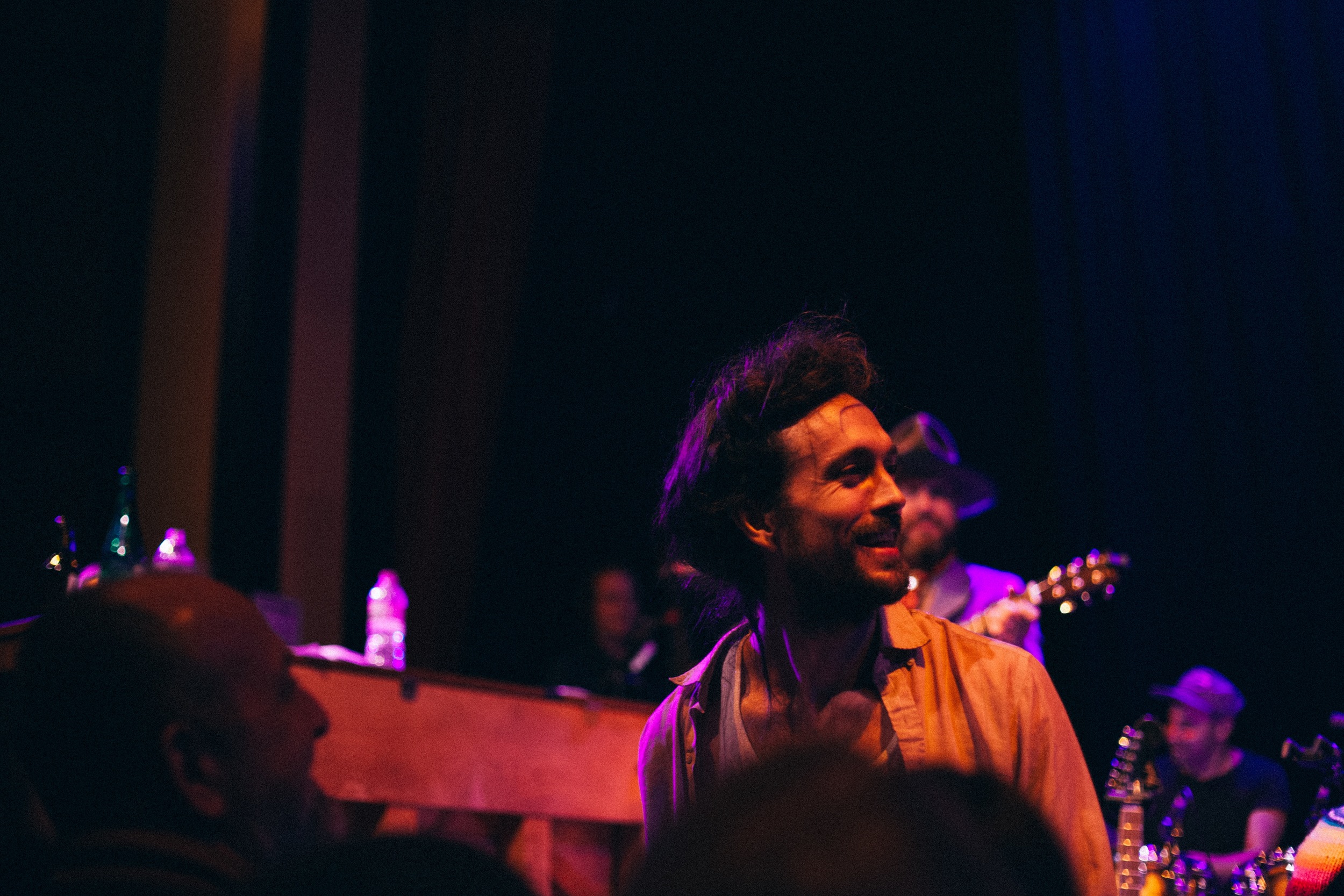
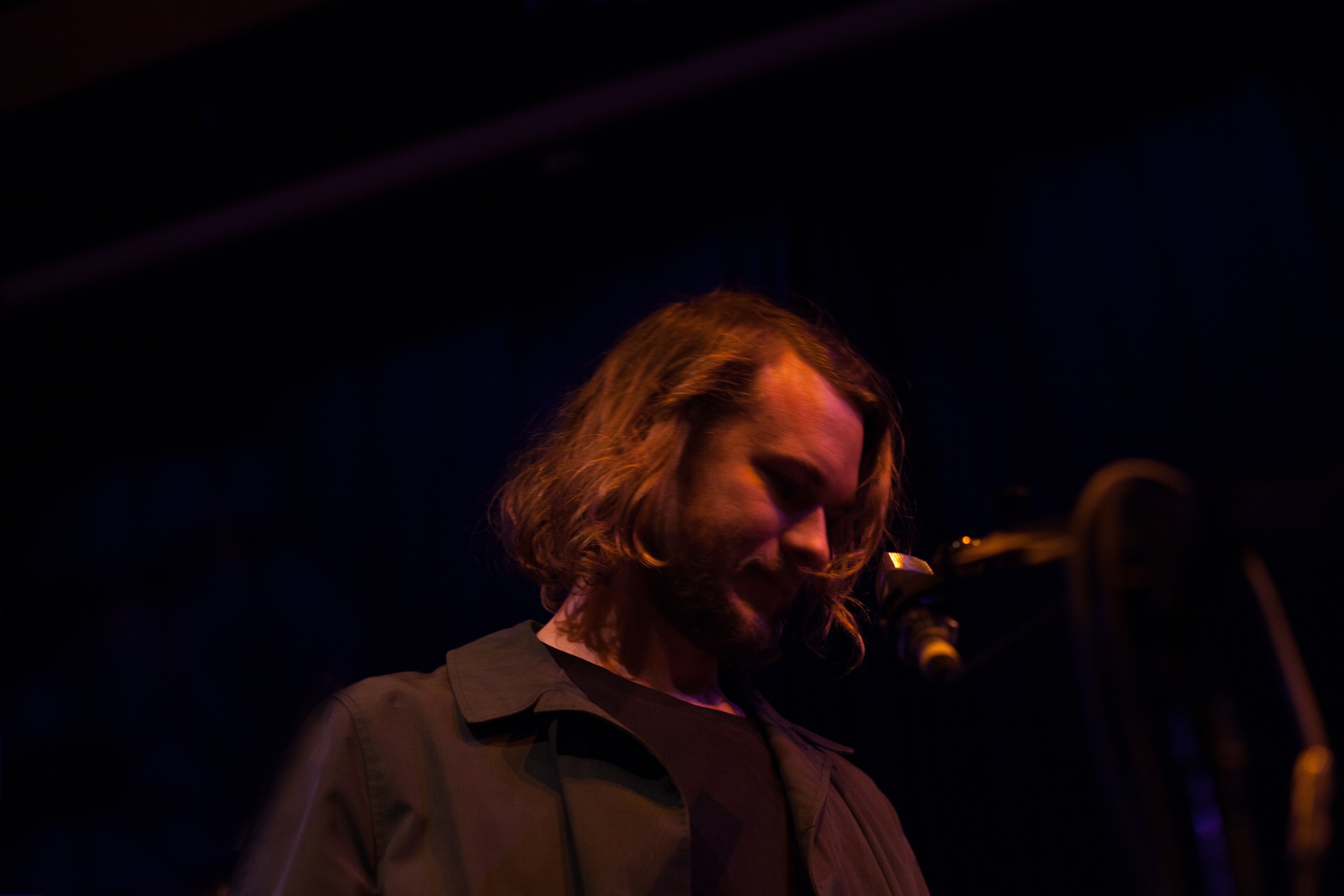
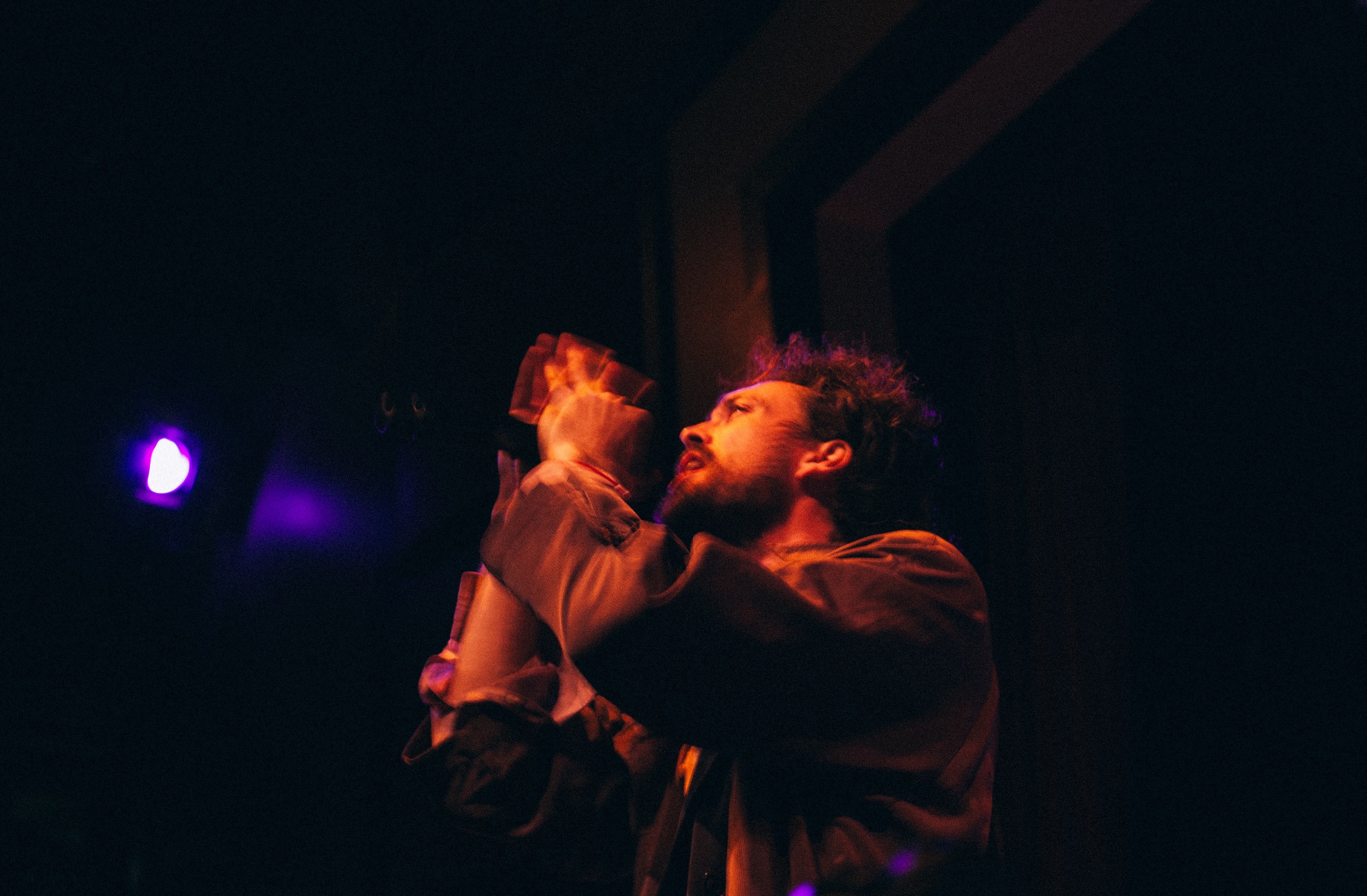


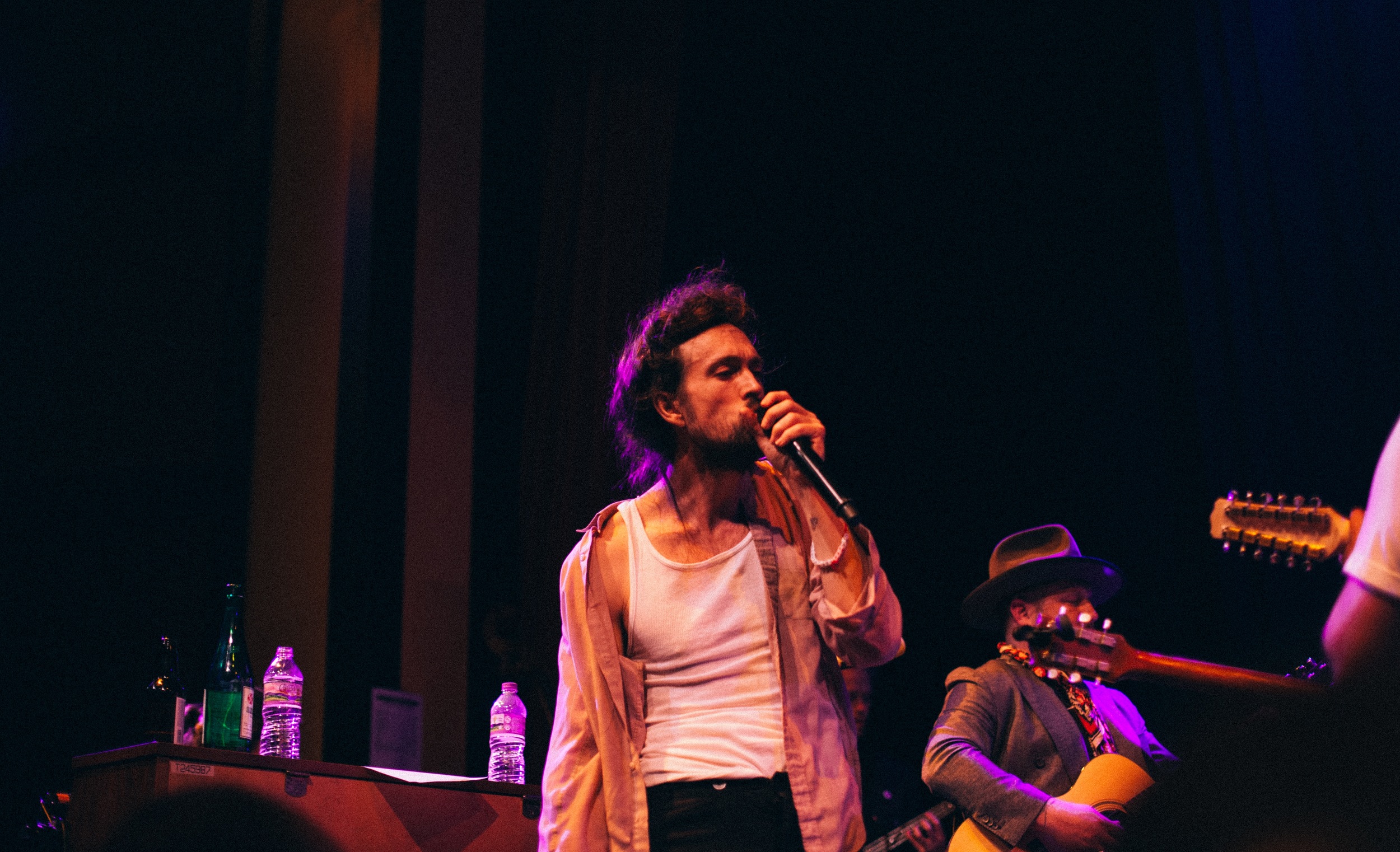
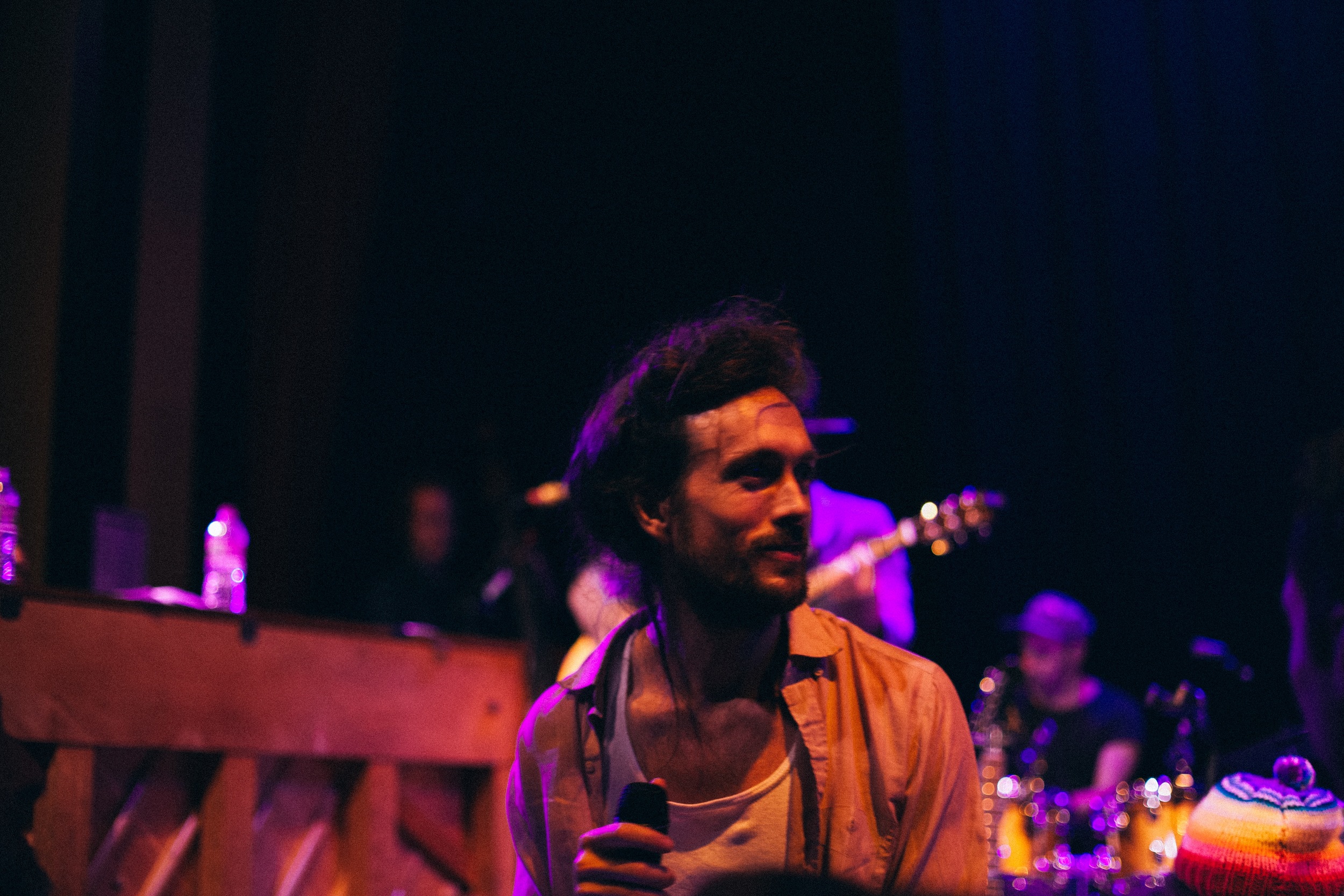
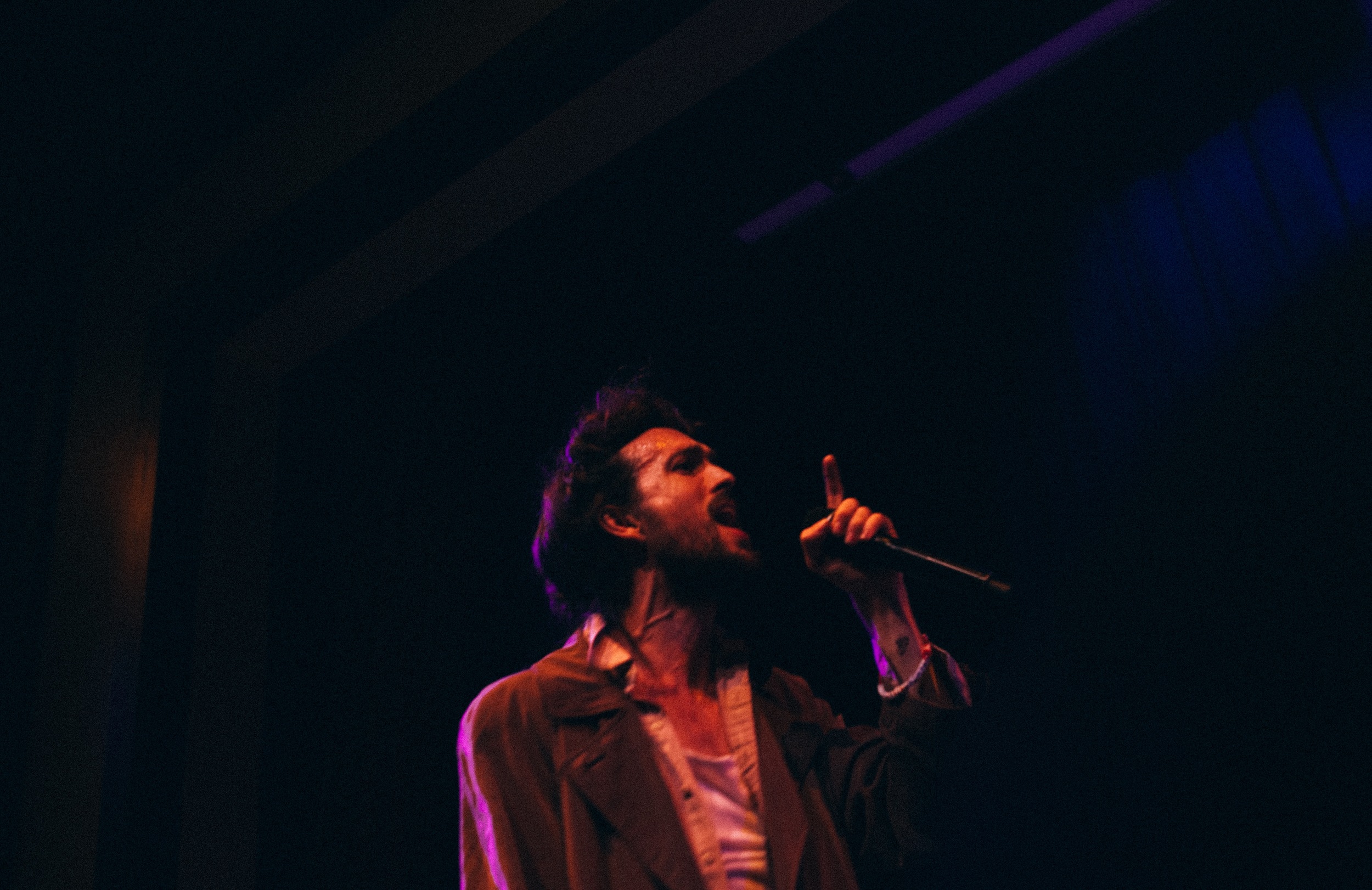
TRANSVERSO: That was your first time performing the new material. How does it feel?
ALEX EBERT: Yeah, it feels good. Feels alright. It’s nice to sort of inaugurate yourself I suppose. [There were] difficulties, you know, [I was] sick all week and what not, so it’s tough; you work through kinks. This album, I think in a lot of ways, is pretty easily our most powerful album to me, so you know where it can go and you know the content that’s waiting to be translated, so when you fall short of that translation it’s apparent in a different kind of way than most of our songs. Most of our songs you can sort of will into form, but these songs are sort of already in their form, waiting for you to sort of inhabit them properly. So it’s a slightly different thing so when you fail; the songs are still sitting there, going [Sucks teeth disapprovingly].
Do you think you failed?
On some of the songs, yeah.
How do you think you failed?
Well we didn’t fail on the recordings for the most part. I’m proudest of this album, but if you don’t recognize that you failed at something it’s very difficult to improve anything. If you have failed a song it’s like the first demo I ever did - [or] the first time I sang, I should say; the first demo I did I was rapping. [Laughs] The first singing demo I ever did I was 19 ‘cause I got to singing late, and I listened to the tape cassette on the way home and I started sobbing ‘cause I was so bad. I mean, it was just so bad. I hated the way I sounded. I cant remember what happened after that, how it was I kept going, but I knew that it was terrible. And I kept going, you know, so I guess that’s the point; you just let that smart. You let it smart, you let it hurt, and [you] keep going.
In the new music video for “No Love Like Yours” you follow your own funeral procession and voluntarily enter your own coffin, and the new album has Edward Sharpe's name crossed out. Is this character dying?
I hope so, yeah. There was no character to begin with, so why not kill him? He never really was there. If anything, and at most, Edward Sharpe was a vehicle for me to get to slough off whatever I had become up until that point, and to get back to or sort of allow my pure self to come forth into sort of a clean slate. A tabula rasa, you know? ‘Cause the Edward Sharpe name had no history but, [Sighs] at the end of the day a name is just a name, you know? We are beneath and above our names, but we aren’t encapsulated within our names. So as time went on and the Edward Sharpe thing started to meld into peoples minds as a character that I was putting on and a mask that I was wearing onstage the entire sort of premise of being myself onstage and allowing my pure self to come through onstage was lost on these people. So I think it’s time to sort of really explain it and one way to explain it is to just cross is out, you know?
You mentioned onstage that you feel uncomfortable lying in a song; you feel uncomfortable with lyrics that aren’t true. How has that affected the Edward Sharpe persona?
Well the first album was a wish. The entire first album for the most part was a wish. I didn’t have a band, but I knew that I wanted a crew - as I said when I was six - so I wrote these songs that needed 10 people to perform them, so they needed an ensemble, and yet I didn’t have that ensemble. So the whole process was, in some ways, a make believe. So I did the horn lines with my mouth or a kazoo on the demos, and I did all the background vocals layering myself, pretending that there were people there. So in that sense it was a make believe, but that’s sort of the process of becoming; you have an intention, you set it, and then you sort of play make believe until you become it, you know? It’s like my old band, Ima Robot. It was called Ima Robot and pretty unironically I ended up feeling like a robot by the end of the process because of the major label thing and all that. So yeah, it can go both ways, so you gotta be careful what you pretend to be, ‘cause you’ll become it.
I noticed on Twitter you said if you had to be just one thing you'd be unrealistic. How do you reconcile realism and truth when you talk about this sort of identity?
Yeah, I think our true nature is all about longing for… [Sigh] It’s constantly calling for our imaginations and our visions, not necessarily our sort of logistical minds. A realist or a pragmatist is really a euphemism for a pessimist, in my view, and pessimism is simply a defense against the pain of failure. The more you believe and the more you desire, and the more that you long for and wish for, and the more that you hope for, the greater the degree of pain you are potentially going to experience when you end up meeting a reality that doesn’t match that hope. So eventually you cut that hope down to sort of match whatever you think the reality will be, but that’s a cowardly move because the only reason that you’re doing that is to avoid the pain of that fall. [Smacks hands together] So when I say that if I had one thing to be I would want to be unrealistic it’s because I’m not well adapted to this reality. As Krishnamurti said, “Anyone who is well adjusted to a sick reality is sick."
I was going to ask you about your support for Bernie Sanders; it’s interesting that you seem to be able to apply that worldview to subjects as disparate as creating music and politics.
Yeah, sure. That said, I think despite how hopeful and dreamy, in my view, in comparison, contextually Bernie Sanders is, these changes are incremental. You have these giant sweeping changes, but when you look [at the big picture] you see that it’s actually an incremental change. You change the laws, you follow customs, [and] slowly those customs change, but these giant sweeping changes are rare to happen. So I don’t support Bernie in a sense [that] he’s the utopian sort of end, and of course the whole vision that he preaches is that he can’t do anything unless we all go in on it with him, and go into midterm elections, and vote in more and more progressive and empathetic people who aren’t beholden to these corporate interests. So for me it’s more of a pragmatic thing with Bernie.
At the same time, [there’s] the idea that you’re not going to support someone if you’re at all famous because somehow your fame is on the line or your name is on the line or it’s embarrassing. I think embarrassment is great to embrace, but not to shy away from [and] not to let it steer you away. So if Bernie fails that’s nothing to me, you know what I mean? It’s nothing to me and it’s going to be nothing to him. You think he’s gonna change ‘cause he fails, or he’s gonna stop doing what he’s doing because he fails? Or change what he’s doing ‘cause he succeeds? I damn sure hope not.
At Bonnaroo 2013 you went up to a man who was standing next to me in the crowd and asked him to tell you a story. He said that a year prior you had played for him in the hospital the day he got a lifesaving treatment, so he had come to see you again.
Right, the kid, yeah. It was the day that we went to see him he got the treatment, he went into surgery right after we saw him. I didn’t know that ‘til later.
What’s your motivation for going into the crowd and getting those stories from your fans?
Motivation? Because I want to. I mean, they’re there for us, I’m there for them. They want to come onstage, I want to go in the crowd. I just try to follow that sort of natural childish urge to go hang out.
Are there any particular stories that stand out to you?
That one, that one. There’s some others; there’s one that happened recently during “If I Were Free.” There’s a whistle intro, and as soon as I started it at Osheaga [2015 for] about 40,000 people this dude was lifted up in a wheelchair. I guess he had MS or muscular dystrophy, or something like that, and he was lifted up by his four friends probably 200 yards away. This crowd just parted like a sea, and they walked him [up] like a coronation [for a] king or something, and we just kept looping this chorus [as] they brought him all the way onstage. We convinced [security] to let him up and then we went through the song, and his friends came onstage with him. The whole band was crying. [Laughs] The whole audience was just sort of in tears. I didn’t cry. I just kept singing, and later went around ate some dinner, and I got to the hotel room probably at 2 AM, and I was alone, and suddenly I just started sobbing. There’s just moments like those, you know?
In the new song “Free Stuff” you talk about other artists “stealing [your] heys and hos.” Elaborate on how you feel your sound has been robbed.
Well the typical response is that you’re supposed to be honored, and I think that’s true to a certain degree. I think you’re especially honored if they openly honor you, and I think that it’s hard to necessarily feel a genuine sense of being honored if they haven’t. When something becomes popular, when suddenly four on the floor of kicks [Taps foot] and [Mimics guitar rhythm] is on every fucking car commercial and everything you can find anywhere, and it’s either a boy and girl singing back and forth or there’s a bunch of heys or whatever it is, and you have this sort of folk pop thing that’s going on…
I will say it’s better than the thing that preceded it as far as pop music goes. To my mind, it’s more palatable than eras of sort of alternative pop that I’ve lived through. But on the other hand, as an artist that cares about moving things forward, it makes me not want to do that music anymore, because if something’s already happening and I’m just gonna reiterate that all I’m doing is participating in a commercial venture.
I could very easily write 10 more songs with four on the floor [Mimics again] and do, you know, like a back and forth thing and a whole bunch of heys and hos. That would be the obvious thing to do, but now that it’s a thing it’s kinda like the instinct is I look for the holes. Okay, now where is there to fill in? What’s missing in the blanket, in the texture of society and culture? Where are the gaps? Where can I be of service? And that is in part what this album is about. In a lot of ways this album does things that are missing.
Read our review of PersonA here.


